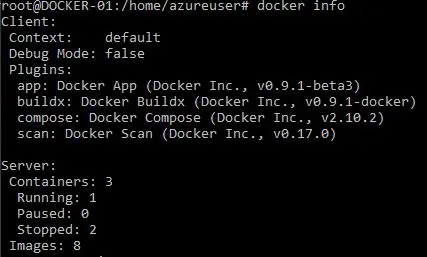Check if the Docker container is running
In Docker, there are multiple ways to check the status of a container. When displaying this information, we can also check if the Docker container is running.
This article will discuss the commands to check if a Docker container is running.
Check if the Docker container is running
In Docker, we have multiple commands to check the status of all created containers. In the next section, we will list various examples of these commands.
docker ps
In Docker, we have a docker pscommand called which lists all containers. If you have received Docker training, docker ps may have become a part of the basic Docker lifecycle.
docker psThe command has several options; however, the two most important ones will be discussed in this section.
The first is the --all or -a option to the command that shows all containers. By default, running the command without the -a option will only show the running containers.
Sample code:
docker ps -a
docker ps
Output:

Furthermore, we can use an additional option to only show running containers. For example, we can use the --filter option to only find containers with status equal to running.
Sample code:
docker ps -a --filter status=running
Output:

The above command is similar to docker container ls -athe command, which lists all containers and their status at the container level.
Bash and docker inspect
Another method we can use to display a running container is programmatically. For example, we can use docker inspect to list the properties of a container.
Since the above command has a JSON output, we can use it with bash.
Sample code:
if [ $(docker inspect -f '{{.State.Running}}' "zen_dirac") = "true" ]; then echo Running; else echo NotRunning; fi
The following code snippet searches for a specific container named zen_dirac and its State.Running property. If the property is equal to True, the command will display the final output Running, otherwise it will display NotRunning.
This code snippet can be helpful if we are managing hundreds of running containers and only need information about a single container. In this case, our zen_dirac container is running, so it should produce the output of Running in our command line.
Output:
Running
docker info
Additionally, if we need a high-level summary report of the containers, we can use docker infothe command. docker infoThe command displays system-wide information, including several running containers.
This command is useful if we don’t need to enter the name of the container but want to check if the container is running.
Sample code:
docker info
Output:

For reprinting, please send an email to 1244347461@qq.com for approval. After obtaining the author's consent, kindly include the source as a link.
Related Articles
Get the IP address of the Docker container from the host using docker inspect
Publish Date:2025/03/26 Views:103 Category:Docker
-
Docker containers are not just for isolation—they are often used to manage processes that still need to communicate directly with each other. However, to communicate, you usually need to know the IP address of each container, which you ca
Solution to incorrect access log time when deploying Nginx in Docker
Publish Date:2025/03/26 Views:165 Category:Docker
-
In the process of operating the website, I never took the logs too seriously. Although logging was turned on, I never analyzed the logs carefully. Today, when I looked at the logs on a whim, I found that the recorded time was 8 hours less t
Docker deploys nginx php application
Publish Date:2025/03/26 Views:131 Category:Docker
-
I'm learning docker recently. I'm learning by building an nginx+php development environment example. Here I record the build process. First, give a docker-compose.yml deployment configuration file version: '3' services: nginx: container_nam
How to use Docker to image a Node.js web application
Publish Date:2025/03/26 Views:107 Category:Docker
-
Docker is a containerization platform that simplifies the packaging and execution of applications. Containers run as independent processes with their own file systems, but share the kernel of their host machine. Docker has attracted much at
Start a Bash terminal in a new Docker container
Publish Date:2025/03/26 Views:97 Category:Docker
-
Docker containers are a standard unit for packaging all the dependencies of an application, allowing us to easily run them in any environment. Containers have become very popular recently, and most developers now rely heavily on containers
Passing environment variables to containers in Docker
Publish Date:2025/03/26 Views:125 Category:Docker
-
This article will introduce how to pass environment variables to containers in Docker. Passing environment variables to containers in Docker using the -e and tags -env We will first see how to create environment variables and pass them to t
Install Docker using Homebrew
Publish Date:2025/03/26 Views:202 Category:Docker
-
There is no doubt that Docker containers have revolutionized the way we develop and deploy applications. They provide developers with the ability to package applications and dependencies in an isolated environment. Recently, we've seen wide
Enforce clean build of images in Docker
Publish Date:2025/03/26 Views:88 Category:Docker
-
This article discusses and demonstrates how to enforce clean builds of images in Docker. Building images in Docker We will use a simple Flask application to demonstrate this concept. my-app Create a app.py simple application named in the ho
Running a Docker instance from a Dockerfile
Publish Date:2025/03/26 Views:140 Category:Docker
-
Docker containers have undoubtedly become the standard unit for managing software and dependencies in different environments. When using real applications, you must create a docker file before building the container image of the application

